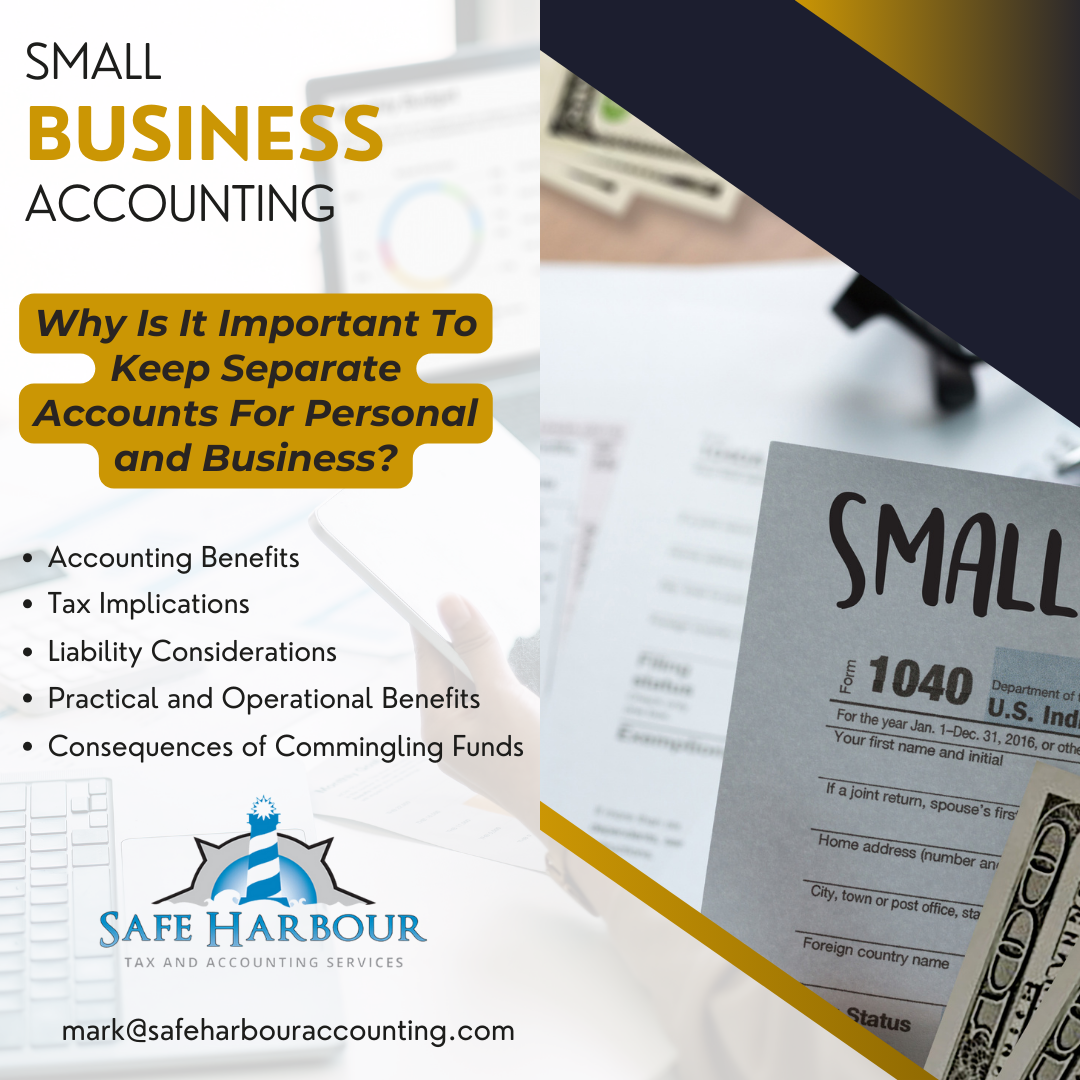
Running a small business is no small feat, and managing finances effectively is a critical aspect of ensuring your venture's success. At Safe Harbour Tax & Accounting Services, we understand the unique challenges that small business owners face. That's why we've crafted a detailed article highlighting the importance of separating business and personal finances.
Whether you’re a startup or an established business, keeping your personal and business finances distinct can streamline your financial management, simplify tax preparation, and provide a clearer picture of your company’s financial health. Dive into our article to learn more about why this practice is essential and how it can benefit your business in the long run.
Accounting Benefits
- Accurate Financial Tracking
- Separating business and personal finances makes it easier to track income and expenses accurately. This clarity is essential for maintaining accurate financial records, preparing financial statements, and analyzing the financial health of your business.
- Simplified Bookkeeping
- Separate accounts simplify bookkeeping, making it easier to manage receipts, invoices, and other financial documents. This reduces errors and streamlines the process of reconciling accounts.
- Efficient Cash Flow Management
- Clear separation allows for better monitoring of cash flow, ensuring that you can easily track how money moves in and out of your business. This helps in making informed financial decisions and planning for future expenses.
Tax Implications
- Easier Tax Preparation
- With separate accounts, preparing taxes becomes more straightforward. You can easily identify business-related transactions, which simplifies the process of claiming deductions and credits. This reduces the risk of missing deductions or misreporting income.
- Avoidance of Tax Issues
- Commingling funds can lead to tax complications. The IRS may scrutinize your records more closely if personal and business expenses are mixed, increasing the risk of audits and penalties. Clear separation demonstrates professionalism and reduces the likelihood of tax issues.
- Accurate Tax Reporting
- Keeping finances separate ensures that only business income and expenses are reported on your business tax return. This accuracy is crucial for complying with tax laws and avoiding potential legal consequences.
Legal and Liability Considerations
- Protecting Limited Liability
- For business structures like LLCs and corporations, maintaining separate accounts helps preserve the limited liability protection these entities provide. Commingling funds can lead to “piercing the corporate veil,” where the business owner may be held personally liable for business debts and legal issues. *NOTE: This is not legal advice. Please contact an attorney for further information.
- Professionalism and Credibility
- Separate accounts enhance your business’s credibility with clients, suppliers, and financial institutions. It shows that you are serious about your business and maintain professional financial practices.
Practical and Operational Benefits
- Simplified Auditing
- If your business is ever audited, having separate accounts makes the process smoother and less stressful. Clear and organized records can expedite the audit process and demonstrate your compliance with financial regulations.
- Easier Loan Applications
- When applying for business loans or credit, lenders will often require detailed financial statements. Separate accounts make it easier to provide accurate and comprehensive financial information, improving your chances of securing financing.
Consequences of Commingling Funds
- Difficulty in Proving Business Expenses
- If you mix personal and business finances, it becomes challenging to prove that certain expenses are business-related. This can lead to disallowed deductions and higher taxable income.
- Increased Audit Risk
- The IRS and other tax authorities may view commingled accounts as a red flag, increasing the likelihood of an audit. During an audit, distinguishing between personal and business expenses can be complicated and time-consuming.
- Legal Risks
- In the event of legal disputes or creditor claims, commingling funds can weaken your defense and potentially expose your assets to risk. *NOTE: This is not legal advice. Please contact an attorney for further information.
Maintaining separate business and personal bank accounts is essential for accurate financial management, tax compliance, legal protection, and professional credibility. It simplifies accounting processes, reduces the risk of tax issues, and protects your assets from business liabilities.
Contact Mark and his team at mark@safeharbouraccounting.com if you have any questions!






